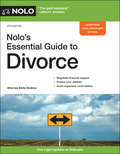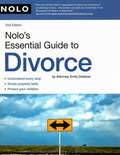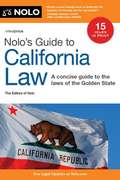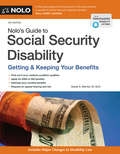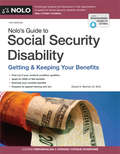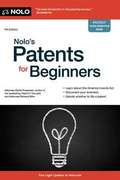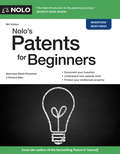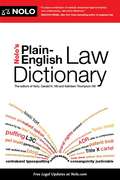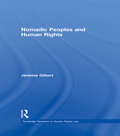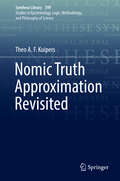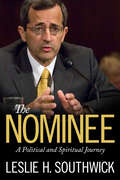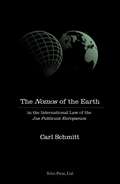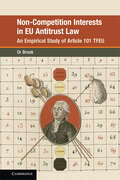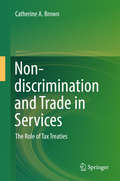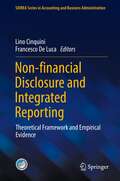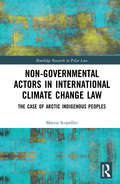- Table View
- List View
Nolo's Essential Guide to Divorce
by Emily DoskowNolo's Essential Guide to Divorce provides clear answers that can help make divorce simpler and reduce its financial and emotional cost. Readers will even learn how to complete the divorce with minimal help from an attorney. With compassion and understanding, Nolo's Essential Guide to Divorce explains what to expect through each stage of divorce. It helps readers: understand the divorce process learn about different types of divorce, including mediated, collaborative, and contested identify and divide property and assets fairly work with mediators or lawyers avoid expensive and painful court battles establish child custody and visitation arrangements handle child support issues, including how support is paid and enforced draft a marital settlement agreement deal with divorce emergencies address post-divorce issues, and negotiate and settle spousal support.
Nolo's Essential Guide to Divorce
by Emily DoskowDivorce guidance you can count on Divorce is never easy, but with the information in Nolo's Essential Guide to Divorce, you can make the process as simple, inexpensive, and conflict-free as possible. With compassion and expertise, family law attorney Emily Doskow explains how to make divorce less painful by helping you: minimize day-to-day conflict with your spouse work with lawyers or mediators without breaking the bank avoid costly, exhausting court battles, and stay calm and make good decisions. You’ll learn about your legal rights and options for resolving tough divorce-related issues, including: child support and custody alimony property division, and drafting a marital settlement agreement. The 8th edition is completely updated with the latest state rules on divorce, such as property division and grounds for divorce.
Nolo's Essential Guide To Divorce
by Emily DoskowThe average contested divorce can cost $50,000 in attorney fees. But it needn't be so expensive and with Nolo's Essential Guide to Divorce, it won't. With compassion and understanding, this book helps readers understand the entire process; work with mediators or lawyers; avoid expensive and painful court battles; divide money and property fairly; establish child custody, visitation and child support; draft a marital settlement agreement and address post-divorce issues. The 2nd edition is completely updated to provide the latest laws and resources and now covers divorce and the military and expanded information on custody schedules and parenting plans.
Nolo's Essential Guide to Divorce
by Emily DoskowNolo's Essential Guide to Divorce provides clear answers that can help make divorce simpler and reduce its financial and emotional cost. Readers will even learn how to complete the divorce with minimal help from an attorney. With compassion and understanding,Nolo's Essential Guide to Divorce explains what to expect through each stage of divorce. It helps readers: understand the divorce process learn about different types of divorce, including mediated, collaborative, and contested identify and divide property and assets fairly work with mediators or lawyers avoid expensive and painful court battles establish child custody and visitation handle child support issues, including how support is paid and enforced draft a marital settlement agreement deal with divorce emergencies address post divorce issues negotiate and settle spousal support On every page, this book stresses the importance of minimizing conflict, explains complex legal problems concisely, and provides advice on how to protect your interests with your dignity and sanity intact. Plus, easy to use charts make it simple to find the divorce laws in your state. This edition includes new information on bankruptcy and foreclosure, and explains how both can affect divorce.
Nolo's Guide to California Law
by Editors Of NoloCalifornia law in broken down in plain-English. This handy little legal reference is an essential resource for every California home and business. Nolo's Guide to California Law provides you with quick, clear answers to the everyday questions you have about: child support custody consumer rights employee rights divorce bankruptcy adoption jury duty real estate debt and credit workplace rights workers' comp wills landlords and tenants serious illness and much more This is the only plain-English guide to the laws that affect Californians every day -- and now it is completely updated, covering domestic partnerships, employment protections, consumer privacy and more! Check out Nolo's list of California products. Not a California resident? Check out Nolo's Encyclopedia of Everyday Law.
Nolo's Guide to California Law (9th edition)
by Lisa Guerin Patricia GimaNolo's Guide to California Law explains the laws that affect you every day. Inside, you'll find hundreds of topics organized into easy-to-find categories. Just look up a legal issue--you'll find a clear explanation of what you need to know. Get the scoop on: courts and lawsuits, families and children, employee rights, government benefits, inheritance and wills, small business, traffic and vehicles, debts and credit, serious illness, landlords and tenants, small businesses, and more. The revised 9th edition is completely updated, and now covers domestic partnerships, employment protections, consumer privacy--and more!
Nolo's Guide to Social Security Disability: Getting & Keeping Your Benefits
by David A. Morton IIINolo's Guide to Social Security Disability covers the criteria for getting disability benefits for back problems, heart and cardiovascular disease, diabetes, cancer, autoimmune diseases, mental issues like depression and anxiety, and 200 more medical conditions. Learn how to match the medical details of your disability to Social Security regulations to make sure you have the right evidence to qualify for the benefits you're due when you apply. This guide is written by a former Chief Medical Consultant for the Social Security Administration whose expert deciphering of the medical portions of SSA regulations will help you understand how you can get benefits. If you've been denied benefits already, this book will tell you how to find out why and what steps to take to prove that you should get benefits on appeal. This edition is completely updated with the latest rules and information plus updated figures for 2018 and many updated medical listings.
Nolo's Guide to Social Security Disability: Getting & Keeping Your Benefits
by David A. Morton IIIQualify for Social Security disability benefits, quickly and easily Nolo's Guide to Social Security Disability covers the criteria for getting disability benefits for back problems, heart and cardiovascular disease, diabetes, cancer, autoimmune diseases, mental issues like depression and anxiety, and 200 other medical conditions. Learn how to match the medical details of your disability to Social Security regulations to make sure you have the right evidence to qualify for the benefits you're due when you apply. This guide is written by a former Chief Medical Consultant for the Social Security Administration whose expert deciphering of the medical portions of SSA regulations will help you understand how you can get benefits. If you’ve been denied benefits already, this book will tell you how to find out why and what steps to take to prove that you should get benefits on appeal. This edition is completely updated with the latest rules and information plus updated figures for 2020 and many updated medical listings.
Nolo's Patents for Beginners
by David Pressman AttorneyPatents are explained in this clear guide to every step of the patenting process. Do you have a great idea for a product? Do you toil away in an office, garage or basement lab day by day in the hopes of bringing a new widget to life? What will you do when it's alive and kicking? Here's the primer every first-time inventor needs. Packed with detailed information and concise explanations, Nolo's Patents for Beginners defines what a patent is and what it can do for you. Step by step, it explains how to: - use basic patent principles - document an invention - conduct a patent search - acquire patent rights - "read" an application - determine patent ownership - analyze disputes - find patent information - interpret international patent law Nolo's Patents for Beginners provides sample forms and letters, resources and a glossary of terms. This edition is completely revised to cover all changes in patent case law and updated regulations for inventors applying for a patent.
Nolo's Patents for Beginners: Quick & Legal
by David Pressman Richard StimA brilliantly clear and up-to-date patent guide Patent law is changing, and this bestselling primer on patent law has up-to-date information on the America Invents Act, the most important change to American patent law in two centuries. Packed with detailed information, Nolo's Patents for Beginners explains how to: document your invention acquire patent rights "read" a patent application understand how and why to make a patent search determine patent ownership find patent information understand international patent law, and decide whether to file a provisional patent. Nolo's Patents for Beginners provides plain-English explanations of patent law, patent and invention resources and a glossary of patent terms. This edition is completely updated to cover all changes in patent law with the latest implications of recent federal patent law reform.
Nolo's Patents for Beginners
by Richard Stim David PressmanA brilliantly clear and up-to-date patent guide Patent law is changing, and this bestselling primer on patent law has up-to-date information on the America Invents Act, the most important change to American patent law in two centuries. Packed with detailed information, Nolo's Patents for Beginners explains how to: document your invention acquire patent rights "read" a patent application understand how and why to make a patent search determine patent ownership find patent information understand international patent law decide whether to file a provisional patent Nolo's Patents for Beginners provides plain-English explanations of patent law, patent and invention resources and a glossary of patent terms. The 8th edition is completely updated to cover all changes in patent law and regulations, including the latest on filing for provisional patent status.
Nolo's Patents for Beginners (5th edition)
by David Pressman Richard StimWhat are patents? Why do you need one? How do you get it? This book provides a clear explanation of the entire process.
Nolo's Plain-English Law Dictionary
by Gerald Hill AttorneyLearn the language of the law, without the legalese! Open the average law dictionary and chances are you'll feel more confused than before you read a word. Nolo's Plain-English Law Dictionary is different. From "abrogate" to "zero tape", we've cut down on the Latin and defined common (and some not-so-common) terms you can really use to understand and access the law. Set aside those dusty, outdated law dictionaries! Written for the 21st century, this essential reference contains complete definitions of the legal terms you need today. If you're a law student, paralegal, accountant, small business owner or librarian -- anyone whose work or life touches the law -- this fully up-to-date A to Z guide puts access to the law into your hands. Nolo's Plain-English Law Dictionary contains 3,800 plain-English legal definitions, including many newly coined terms you'll find online and off, such as "typosquatting" and "patent troll". Of course, if you need definitions for legal standards -- even when they're in Latin -- you'll find those here too. Plus, find a copy of the Constitution of the United States of America for your reference in the pages following the complete list of definitions.
Nolo's Quick LLC: All You Need to Know About Limited Liability Companies (Quick & Legal)
by Anthony MancusoLimit your liability, simplify taxes with an LLC. If you run your own business as a sole proprietorship or partnership, you’ve probably heard of the advantages of limited liability companies—especially the way an LLC can protect personal assets from business debts. But LLCs aren’t the best structure for every business.
Nolo's Simple Will Book (7th edition)
by Denis CliffordMaking a will is a significant matter, worth serious thought. Happily, however, writing your will does not have to be difficult, and most people don't need a lawyer to do it. Nolo has been helping people make their own legally valid wills for more than 25 years, and Nolo's Simple Will Book, remains one of our most popular estate planning books--for good reason. It has clear, easy-to-understand instructions, and it explains when you might need a lawyer's help. The wills in this book are legal in every state except Louisiana (which has its own set of estate planning laws that differs from all other states'). These wills are fine for most folks with a modest to moderate amount of property and typical assets. If you have a more complicated situation, or a large estate--say, more than $2 million--you will probably want some additional help from a lawyer or tax expert.
Nomadic Peoples and Human Rights (Routledge Research in Human Rights Law)
by Jérémie GilbertAlthough nomadic peoples are scattered worldwide and have highly heterogeneous lifestyles, they face similar threats to their mobile livelihood and survival. Commonly, nomadic peoples are facing pressure from the predominant sedentary world over mobility, land rights, water resources, access to natural resources, and migration routes. Adding to these traditional problems, rapid growth in the extractive industry and the need for the exploitation of the natural resources are putting new strains on nomadic lifestyles. <P><P> This book provides an innovative rights-based approach to the issue of nomadism looking at issues including discrimination, persecution, freedom of movement, land rights, cultural and political rights, and effective management of natural resources. Jeremie Gilbert analyses the extent to which human rights law is able to provide protection for nomadic peoples to perpetuate their own way of life and culture. The book questions whether the current human rights regime is able to protect nomadic peoples, and highlights the lacuna that currently exists in international human rights law in relation to nomadic peoples. It goes on to propose avenues for the development of specific rights for nomadic peoples, offering a new reading on freedom of movement, land rights and development in the context of nomadism.
Nomic Truth Approximation Revisited (Synthese Library #399)
by Theo A. KuipersThis monograph presents new ideas in nomic truth approximation. It features original and revised papers from a (formal) philosopher of science who has studied the concept for more than 35 years.Over the course of time, the author's initial ideas evolved. He discovered a way to generalize his first theory of nomic truth approximation, viz. by dropping an unnecessarily strong assumption. In particular, he first believed to have to assume that theories were maximally specific in the sense that they did not only exclude certain conceptual possibilities, but also that all non-excluded possibilities were in fact claimed to be nomically possible.Now, he argues that the exclusion claim alone, or for that matter the inclusion claim alone, is sufficient to motivate the formal definition of being closer to the nomic truth. The papers collected here detail this generalized view of nomic truthlikeness or verisimilitude.Besides this, the book presents, in adapted form, the relation with several other topics, such as, domain revision, aesthetic progress, abduction, inference to the best explanation, pragmatic aspects, probabilistic methods, belief revision and epistemological positions, notably constructive realism.Overall, the volume presents profound insight into nomic truth approximation. This idea seeks to determine how one theory can be closer to, or more similar to, the truth about what is nomically, e.g. physically, chemically, biologically, possible than another theory. As a result, it represents the ultimate goal of theory oriented empirical science.Theo Kuipers is the author of Studies in Inductive Probability and Rational Expectation (1978), From Instrumentalism to Constructive Realism (2000) and Structures in Science (2001). He is the volume-editor of the Handbook on General Philosophy of Science (2007).In 2005 there appeared two volumes of Essays in Debate with Theo Kuipers, entitled Confirmation, Empirical Progress, and Truth Approximation and Cognitive Structures in Scientific Inquiry.
The Nominee: A Political and Spiritual Journey (Willie Morris Books in Memoir and Biography)
by Leslie H. SouthwickPresident George W. Bush nominated Leslie H. Southwick in 2007 to the federal appeals court, Fifth Circuit, based in New Orleans. Initially, Southwick seemed a consensus nominee. Just days before his hearing, though, a progressive advocacy group distributed the results of research it had conducted on opinions of the state court on which he had served for twelve years. Two opinions Southwick had signed off on but not written became the center of the debate over the next five months. One dealt with a racial slur by a state worker, the other with a child custody battle between a father and a bisexual mother. Apparent bipartisan agreement for a quick confirmation turned into a long set of battles in the Judiciary Committee, on the floor of the Senate, and in the media.In early August, Senator Dianne Feinstein completely surprised her committee colleagues by supporting Southwick. Hers was the one Democratic vote needed to move the nomination to the full Senate. Then in late October, by a two-vote margin, he received the votes needed to end a filibuster. Confirmation followed.Southwick recounts the four years he spent at the Department of Justice, the twelve years on a state court, and his military service in Iraq while deployed with a Mississippi National Guard Brigade. During the nomination inferno Southwick maintained a diary of the many events, the conversations and emails, the joys and despairs, and quite often, the prayers and sense of peace his faith gave him--his memoir bears significant spiritual content. Throughout the struggle, Southwick learned that perspective and growth are important to all of us when making decisions, and he grew to accept his critics, regardless of outcome. In The Nominee there is no rancor, and instead the book expresses the understanding that the difficult road to success was the most helpful one for him, both as a man and as a judge.
The Nomos of the Earth: in the International Law of the Jus Publicum Europaeum
by Carl SchmittThe Nomos of the Earth is Schmitt's most historical and geopolitical book. It describes the origin of the Eurocentric global order, which Schmitt dates from the discovery of the New World, discusses its specific character and its contribution to civilization, analyzes the reasons for its decline at the end of the 19th century, and concludes with prospects for a new world order. It is a reasoned, yet passionate argument in defense of the European achievement - not only in creating the first truly global order of international law, but also in limiting war to conflicts among sovereign states, which, in effect, civilized war. In Schmitt's view, the European sovereign state was the greatest achievement of Occidental rationalism; in becoming the principal agency of secularization, the European state created the modern age. Since the problematic of a new nomos of the earth has become still more critical with the onset of the post-modern age and post-modern war, Schmitt's text is even more timely and challenging. <p><p> Remarkable in Schmitt's discussion of the European epoch of world history is the role played by the New World, which ultimately replaced the Old World as the center of the earth and became the arbiter in European and world politics. According to Schmitt, the United States' internal conflicts between economic presence and political absence, between isolationism and interventionism, are global problems, which today continue to hamper the creation of a new world order. But however critical Schmitt is of American actions at the turn of the 20th century and after World War I, he considered the United States to be the only political entity capable of resolving the crisis of global order.
Non-Competition Interests in EU Antitrust Law: An Empirical Study of Article 101 TFEU (Global Competition Law and Economics Policy)
by Or BrookThis book is the first to empirically examine the role of non-competition interests (public policy) in the enforcement of the EU's prohibition on anti-competitive agreements. Based on an original quantitative and qualitative database of over 3,100 cases, this book records all of the public enforcement actions of Article 101 TFEU taken by the Commission, EU Courts, and the national competition authorities and courts of five representative Member States (France, Germany, Hungary, the Netherlands, and the UK). The book not only exposes explicit tools in which non-competition interests played a role, but also sheds light on the “dark matter” of balancing, namely, invisible forms of balancing triggered by the institutional and procedural setup of the competition enforcers. Moreover, it contributes to the empirical-legal study of various other aspects of EU competition law enforcement, such as its objectives, the more economic approach, decentralized enforcement, and the functioning and success of Regulation 1/2003.
Non-consensual Image-based Sexual Offending: Bridging Legal and Psychological Perspectives (Palgrave Studies in Cyberpsychology)
by Dean Fido Craig A. HarperThis book presents a timely analysis of the psychological influences, underpinnings, and predictors of non-consensual image-based sexual offending (NCIBSO), such as revenge pornography, cyber-flashing, deepfake media production and upskirting. In this rapidly expanding field, this book offers a novel perspective that encompasses both a forensic psychoanalytic analysis of offending behaviours and an examination of the influence of our use of online environments and digital platforms on these behaviours. The authors begin by outlining the historical and legal context before moving on to a critique of previously posited motivating factors. Rather than conceptualising NCIBSO in purely gendered terms, they demonstrate the potential for a psychological framework to facilitate a better understanding of how and why people engage in a range of non-consensual sexual image offences. In doing so it will provide fresh insights for policymakers and clinicians, in addition to scholars from across the fields of psychology, sociology, criminology, law, media and gender studies.
Non-discrimination and Trade in Services
by Catherine A. BrownThis book argues that the proliferation of global trade and the increasing power of free trade arrangements leave income taxes as one of the few remaining measures that can potentially be used for protectionist purposes. It analyzes the interaction between the non-discrimination principles in tax treaties and trade-related agreements including multilateral (WTO), regional (NAFTA, AANZTA) and bilateral free trade agreements. The absence of a non-discrimination obligation with respect to tax measures that apply to non-resident service providers and to non-resident services may, therefore, significantly undermine trade obligations. The book clearly reveals how these tax barriers to trade may unfairly or unnecessarily restrict trade in services, and puts forward a new, more effective non-discrimination obligation in tax matters to be included in tax treaties, one that would more closely parallel the non-discrimination obligations in trade agreements. The book examines the concept of non-discrimination in tax matters from several perspectives, specifically a North American and Australian perspective, as well as a perspective based on EU (and UK) law, focusing on the interaction between these legal systems, bilateral tax treaties, regional trade agreements and, where relevant, the General Agreement on Trade in Services (GATS). The book explores the possibility of a reciprocal influence between tax treaties and trade agreements, and poses the question as to whether tax treaties might do more in providing a non-discrimination principle in the cross-border trade in services.
Non-Discrimination in International Trade in Services
by Nicolas F. Diebold"The principle of non-discrimination is fundamental to the regulation of international trade in goods and services. In the context of trade in goods, the concept of 'like products' has become a key element of the legal analysis of whether a trade obstacle violates GATT non-discrimination obligations. The equivalent concept of 'like services and service suppliers' in GATS rules on non-discrimination has received little attention in WTO jurisprudence. In light of the remaining uncertainties, Nicolas Diebold analyses the legal problems of the GATS 'like services and services suppliers' concept using a contextual and comparative methodology. The 'likeness' element is not analysed in isolation, but in context with 'less favourable treatment' and regulatory purpose as additional elements of non-discrimination. The book also explores how far theories from non-discrimination rules in GATT, NAFTA, BITs and EC as well as market definition theories from competition law may be applied to 'likeness' in GATS"--
Non-financial Disclosure and Integrated Reporting: Theoretical Framework and Empirical Evidence (SIDREA Series in Accounting and Business Administration)
by Lino Cinquini Francesco De LucaThe increasingly crucial role of companies’ non-financial disclosure (NFD) and integrated reporting (IR) has led to a lively debate among academics, practitioners, and regulators on the approaches, framework, contents, principles, and standards that should oversee these forms of reporting. Through several expert contributions, conducted both with qualitative and quantitative methodologies, this book provides an up-to-date portrait of the debate by exploring corporate NFD either in its mandated contents or voluntary information. Contributing authors provide studies that encompass the different lines of NFD, namely non-financial risk reporting, sustainability reporting, and intellectual capital reporting, as well as the integration of financial and non-financial information through IR, the assurance of the NFD and IR through auditing activities, and the role of management and CFOs in NFD and IR.
Non-Governmental Actors in International Climate Change Law: The Case of Arctic Indigenous Peoples (Routledge Research in Polar Law)
by Marzia ScopellitiFocusing on how to improve the participation of non-governmental actors in the making of international climate change laws, this book is a conversation on the relevance of a human rights-based approach to international climate change law-making. The book considers a possible reform of the United Nations Framework Convention on Climate Change institutional arrangement, inspired by the practice and model of participation of Arctic Indigenous Peoples in the Arctic Council. Different non-State entities play a fundamental role in the development and enforcement of the climate change regime by enhancing the knowledge base of decision-making, keeping States in line with their commitments, and engaging in private initiatives aimed at mitigating the impacts of global warming. Albeit non-governmental and subnational actors increasingly work alongside States in the making of a climate change regime, the category of observers through which they participate in intergovernmental negotiations only gives them limited rights and their participation in international norm-making has at times been impaired. The relevance of a human rights-based approach consists in recognising the status of individuals and groups as rights-holders under human rights law, a paradigm that was first established by Arctic Indigenous Peoples when claiming their participatory rights in the Arctic Council, the main forum of governance of the Arctic region. This book argues that, in the absence of a globally binding treaty regulating procedural rights in intergovernmental negotiations, the emerging relationship between human rights and climate change could serve as a legal basis for the enhancement of non-governmental actors’ procedural rights, establishing the right to participation as a right in itself and which can benefit the governance of climate change. Due to the relevance of the addressed subject, the book is destined to a broad readership and will be of use to academic researchers, law practitioners, policy-makers and non-governmental organisations’ representatives.

